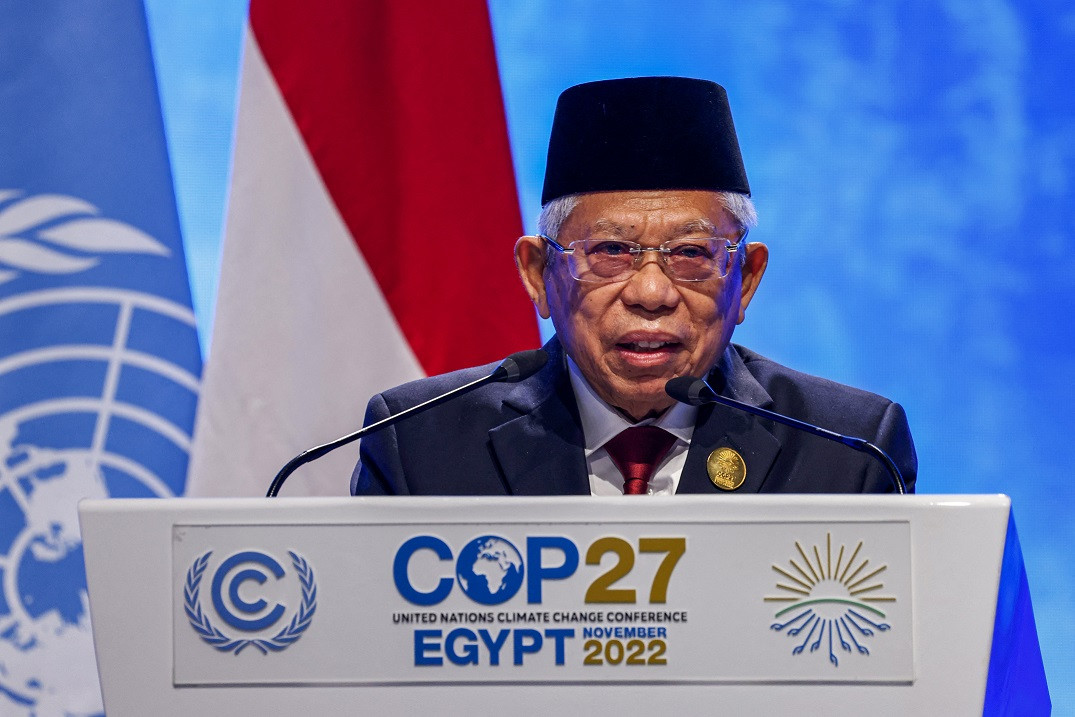Popular Reads
Top Results
Can't find what you're looking for?
View all search resultsPopular Reads
Top Results
Can't find what you're looking for?
View all search resultsCautious COP27
Under the shadow of the global inflation crisis and the Ukraine war, governments and companies have refrained from making big promises during the first week of United Nations climate conference (COP27) negotiations.
Change text size
Gift Premium Articles
to Anyone

The United Nations climate conference (COP27) started off in a grim mood on Sunday. Under the shadow of the global inflation crisis and the Ukraine war, governments and companies have refrained from making big promises during the first week of negotiations in Sharm El-Sheikh, an Egyptian resort city by the Red Sea.
Indonesia, represented by Vice President Ma’ruf Amin and Environment and Forestry Minister Siti Nurbaya, was no exception. Ma’ruf emphasized that wealthier nations would have to help and empower other countries in the spirit of “burden sharing” not “burden shifting”.
Many countries, both rich and poor, argue that the war and ongoing macroeconomic woes are the major reasons for the lack of ambitious emissions targets or financing pledges this year. Countries are advancing their domestic interests while companies are worried about their survival.
This is very concerning. From droughts to floods and cyclones, a flurry of natural disasters has ravaged countries this year, causing harvest failures and food crises, destroying lives. Hearing the bleak message from the UN climate conference, one of the largest summits of nations in the world, hopes look dim that there will be sufficient collective action to save humanity from the catastrophic impacts of the heating planet.
In the face of a gloomy outlook next year, it is more critical now than ever that countries join hands to brace for the hardships.
The world cannot expect developing and poor countries to take the lead. Even if they want to, they lack the resources to take on the burden of reducing emissions while also enduring dire global economic straits. This is especially so for island and archipelagic nations that are prone to natural disasters. When a disaster hits, they will need financial assistance to recover.
Rich countries cannot continue to shirk their duty to help poor countries in their climate efforts. Using so many arguments, they have avoided their commitments since the 1992 Kyoto Protocol. In 2015, under the Paris Agreement, the wealthier nations promised to mobilize US$100 billion per year in public and private financing to help poor countries build their resilience against climate change. The funding has never reached the target. In 2020, the Organization for Economic Cooperation and Development (OECD) reported that US$83.3 billion had been collected.
Developing countries such as Pakistan have also campaigned for the establishment of a “loss and damage” financing mechanism in which countries that have suffered from natural disasters and extreme weather would be reimbursed by developed countries. There is little hope that this will materialize in this year’s conference.
Entering the second and final week of COP27 meetings, we are hoping for commitments from all parties to carry out the global fight against the impacts of climate change. The second week of COP27 will also coincide with the Group of 20 Leaders’ Summit in Bali, in which we are also hoping to see countries resolve their differences and join forces to cope with the impacts of coming global economic challenges.
As the John Donne poem goes, “No man is an island”. Now it is really time to come together.











